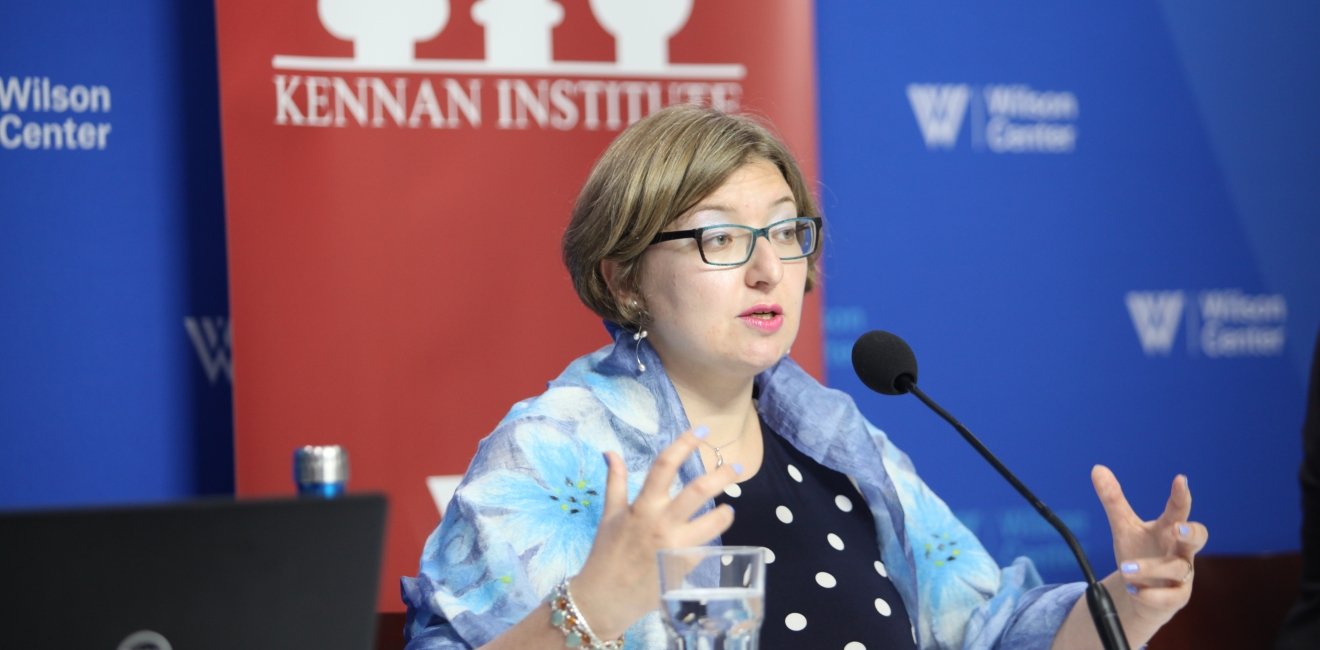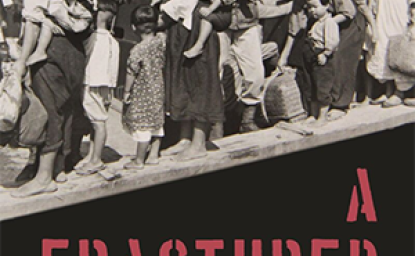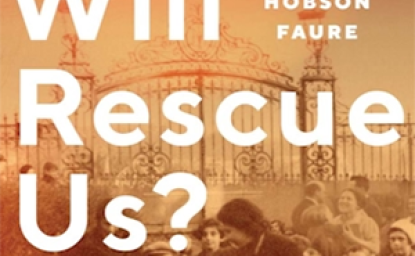Natalie Belsky is a former Title VIII Research Scholar with the Kennan Institute, where she focused her research on the social history of evacuation in the Soviet Union during World War II. We asked her to reflect on her work at the Kennan Institute and tell us more about how she became interested in her research topic.
Q: Describe your background and what brought you to the Wilson Center.
I was born in Russia, though I grew up in the United States. I am a historian of the Soviet Union and received a doctorate in history from the University of Chicago. I am currently a faculty member at the University of Minnesota Duluth. A few summers ago, I came to the Wilson Center as a summer fellow and really enjoyed the opportunity to work with the resources available in DC and take advantage of the talks and events at the Center. The Wilson Center is an incredible place to meet and learn from some of the key experts in the field, and it provides a very stimulating environment for scholarship. My time at the Wilson Center has made me a better educator and a stronger researcher, as I've been able to become better versed in current scholarship in the region, which I hope to bring back to my students in Duluth when I go back to teaching in the fall.
Q: What project are you working on at the Center?
I am currently completing a book manuscript that is based off of my dissertation research. My project examines the experiences of evacuees in the Soviet Union during the Second World War. In the wake of the conflict, millions of people fled or were evacuated from the western regions of the Soviet Union, soon to be occupied by the Nazis, to the Soviet home front (Central Asia, Kazakhstan, Urals, and Siberia). There many of them survived the war. As a result of this displacement, people of different ethnic, cultural and professional backgrounds came into contact with one another, and local communities were transformed. My work specifically looks at the interactions and relationships between evacuees, local residents and Soviet authorities on the home front. The evacuation experience truly put the Soviet principles of equality and fraternity within the multi-ethnic state to the test. My project aims to answer several questions: How did local residents and evacuees perceive one another? How were new arrivals integrated (or not?) into new communities? What does this tell us about notions of citizenship, entitlement and belonging in the USSR? How does the story of the evacuation help us better understand the impact and legacy of the Second World War in the lives of ordinary citizens?
Q: How did you become interested in your research topic?
The period of the Second World War in the USSR and the Holocaust has always been of great interest to me. As anyone who has ever seen footage of Victory Day celebrations in Russia or the post-Soviet states can testify, the war continues to loom large in Russia and the post-Soviet states today. In fact, it continues to serve as a legitimizing myth for the leadership in Russia today. Yet, given the importance of the event, it strikes me that we still don't know very much about the everyday experience of the war for ordinary people, particularly on the home front. It seems to me that exploring that history will allow us to have a fuller and more nuanced understanding of the legacy of the conflict.
I should add that I also became fascinated with the history of the evacuation through my family history. Three of my grandparents were evacuated as children during the war. In fact, in the case of my paternal grandmother, evacuation saved her and her parents from the fate of many other members of her family who perished in Babii Yar, the massacre site where thousands of Kievan Jews were killed in late September 1941. Had they not been evacuated, neither my father nor I would ever have been born. My maternal grandfather was evacuated from soon-to-be besieged Leningrad with his sister. In fact, they were initially evacuated to the southwest, in the direction of the approaching enemy, and were re-routed under enemy bombing. My grandfather and his sister spent the war in the rural Kirov region, and I grew up hearing his stories of working as the horse care-taker in the village where they lived. I struggled to imagine my grandfather, who lived in Moscow most of his life and was a classical music buff, spending his days riding horseback and sleeping in the stables. These stories made me very curious to better understand how individuals coped with their changed environment during the war and the impact this experience had on their later trajectories.
Q: Why do you believe that your research matters to a wider audience?
A cursory perusal of the headlines today makes it clear that migration and its consequences continues to be an important challenge for states, societies and communities around the world. My project examines a case of internal migration within a multi-ethnic and multi-cultural society and considers the challenges presented by migration, even in a case in which individuals are not crossing international borders. I think it's critical for us to understand that mass migration is not a new phenomenon and that it is simply the reality of human experience. Moreover, migration presents important opportunities and challenges. At the same time, my research demonstrates that we need to consider the perspectives and experiences of migrant populations in a more nuanced way.
Q: What is the most challenging aspect of your research?
As a social historian, I strive to get as accurate a portrayal as I can of what everyday life was like for evacuees. This is hard to do when the available sources are state archival materials and memoirs. State archives tend to reflect the issues that officials were interested in and the kinds of things that people tended to report to the state (complaints, requests, appeals, etc.). It is understandable that there are many aspects of everyday experience that the state is not particularly interested or invested in, particularly in the midst of a war for its very survival. Memoirs, on the other hand, reflect other biases - many were written decades after the events described and fall victim to the general pitfalls of human memory. Over the course of working on this project, I've have the privilege to meet many people who experienced evacuation or whose relatives (parents, grandparents) were evacuees. That has been incredibly rewarding. I try to do my best to respect people’s different experiences but, in writing a monograph, it's simply impossible to account for the experiences of millions of people. I have to focus on general trends and commonalities, but the history really comes to life when you can provide individual stories. It can be a real challenge to find the balance between the richness of individual experience and the need to present a broader narrative.
Q: What do you hope the impact of your research will be?
On the very basic level, I hope that my work will help get the story out there and enrich our understanding of the Second World War. Many people, including experts in the field, lack a sense of the sheer scale and significance of civilian displacement in the USSR during the war. There is just not that much (with some prominent exceptions) written on the topic. In many ways, this story fell victim to the political climate of the Cold War when neither the West nor the USSR was particularly invested in publicizing these narratives.
Yet, in recent years, I've noticed that the evacuation story has become a bigger part of the mythology of the Second World War in Russia and the post-Soviet states. In most cases, the evacuation is seen as further evidence of the great accomplishments and sacrifice of the Soviet people. While I do not deny that, I believe my work presents an important corrective in demonstrating that the evacuation experience was much more complex and three-dimensional than is often discussed or recognized.
Finally, I hope that my work will also be seen in a broader light to help us understand the way in which migration introduces key dynamics that shape communities, both in ways that are predictable and ways that are not. Moreover, I believe that it demonstrates the importance of considering internal migration, not just cross-border migration which seems to get the lion's share of attention. Furthermore, I hope my project helps others realize that migration plays a critical role in defining how we understand ourselves and our own communities.
The opinions expressed in this article are those solely of the authors and do not reflect the views of the Kennan Institute.
Author

Assistant Professor, University of Minnesota Duluth; Former Title VIII Summer Research Scholar

Kennan Institute
After more than 50 years as a vital part of the Wilson Center legacy, the Kennan Institute has become an independent think tank. You can find the current website for the Kennan Institute at kennaninstitute.org. Please look for future announcements about partnership activities between the Wilson Center and the Kennan Institute at Wilson Center Press Room. The Kennan Institute is the premier US center for advanced research on Eurasia and the oldest and largest regional program at the Woodrow Wilson International Center for Scholars. The Kennan Institute is committed to improving American understanding of Russia, Ukraine, Central Asia, the South Caucasus, and the surrounding region through research and exchange. Read more





